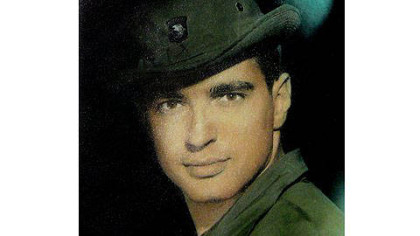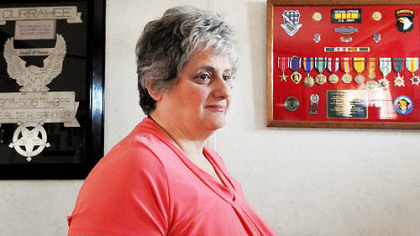

Top: Leslie Sabo will posthumously receive the Medal of Honor. Sabo was killed in 1970 after trying to save fellow soldiers during a fierce, daylong battle in Cambodia.
Bottom: Rose Mary Sabo Brown of Hickory will be presented with the Medal of Honor from President Barack Obama on behalf of her husband, Leslie Sabo, who was killed in 1970 during a fierce battle in a Cambodian jungle.
By Torsten Ove
April 18, 2012
Pittsburgh Post-Gazette
It took 42 years, but an Ellwood City soldier who died in a Cambodian jungle after a ferocious, daylong battle during the Vietnam War in 1970 will be decorated next month with the nation's highest military honor.
On May 16, President Barack Obama will present the Medal of Honor to Rose Mary Sabo Brown, widow of Spc. Leslie Sabo, the skinny hometown boy she married in 1969 while he was home on leave.
Sabo died May 10, 1970, while trying to save fellow soldiers during the "Mother's Day ambush" that killed seven of his 101st Airborne Division comrades.
Ms. Brown was fielding media calls Tuesday from around the country, but she'd known about the president's intentions since April 2.
"President Obama called me at my home to say he was going to award the medal to Leslie," said Ms. Brown, 62, who remarried, raised children and divorced and maintains a shrine of sorts to her first husband at her home in Hickory, near New Castle, Lawrence County.
"He told me he can't wait to meet me and host my family at the White House. I'm anxious to meet him."
More than 120 people will attend the White House ceremony, including Sabo's brother, George, and about 50 men from his unit in Vietnam -- Bravo Company, 3rd Battalion, 506th Infantry Regiment.
For years, many Bravo veterans who witnessed his courage on May 10 had pushed for him to be recognized.
After hours of desperate fighting to keep his unit from being surrounded, Sabo left cover to start first aid on a wounded comrade, then threw himself on top of the man to shield him from a grenade blast. Badly wounded by fragments in his back, he jumped up and counterattacked, hurling his own grenades and killing two North Vietnamese soldiers.
As the battle dragged on and the unit's ammo ran low, Sabo sprinted through fire again to strip ammo belts from fallen soldiers to distribute to the other men. He ducked behind a tree and was shot in the leg.
As darkness fell, it was up to his platoon to secure a landing zone for helicopters to evacuate 30 wounded men.
When the choppers arrived, Sabo stepped from behind cover once again and opened fire with his M16, forcing the enemy to seek cover and allowing other soldiers to kill a North Vietnamese soldier who had been standing in the landing zone.
Sabo's ammo finally ran out. As he was loading another clip, he was hit multiple times and collapsed in the dirt.
He was 22.
One of his fellow soldiers, who has since died, recommended him for the Medal of Honor shortly after the engagement. But the recommendation and the description of what Sabo did that day was lost in the bureaucracy.
It languished for decades until 1999, when Alton "Tony" Mabb, a Vietnam veteran of the 101st Airborne and a columnist for Screaming Eagle, the division association magazine, came across the story while visiting the National Archives military repository in College Park, Md., to do research on Vietnam Medal of Honor winners.
Mr. Mabb wrote about Sabo in the magazine.
He also contacted Democratic Florida Rep. Corrine Brown, who wrote to the Defense Department asking that Sabo be recognized.
In 2006, then-Secretary of the Army Francis Harvey recommended Sabo for the medal.
But there was a problem: The Medal of Honor must be awarded within three years of a soldier's action. An extension requires an act of Congress.
So the congresswoman worked to insert language into the 2008 defense authorization bill that extended the statute of limitations for Sabo.
After President George W. Bush signed the bill, Sabo's family contacted Rep. Jason Altmire, D-McCandless, for help in shepherding the process through the Defense Department again.
Finally, in March 2010, Secretary of the Army John McHugh said he would recommend the medal for Sabo.
The Medal of Honor is relatively rare. Of the 2.1 million men who served in Vietnam, 246 earned it -- 154 of them posthumously.
The medal was made a permanent decoration in 1863, during the Civil War. To date, 3,468 have been awarded.
Bottom: Rose Mary Sabo Brown of Hickory will be presented with the Medal of Honor from President Barack Obama on behalf of her husband, Leslie Sabo, who was killed in 1970 during a fierce battle in a Cambodian jungle.
By Torsten Ove
April 18, 2012
Pittsburgh Post-Gazette
It took 42 years, but an Ellwood City soldier who died in a Cambodian jungle after a ferocious, daylong battle during the Vietnam War in 1970 will be decorated next month with the nation's highest military honor.
On May 16, President Barack Obama will present the Medal of Honor to Rose Mary Sabo Brown, widow of Spc. Leslie Sabo, the skinny hometown boy she married in 1969 while he was home on leave.
Sabo died May 10, 1970, while trying to save fellow soldiers during the "Mother's Day ambush" that killed seven of his 101st Airborne Division comrades.
Ms. Brown was fielding media calls Tuesday from around the country, but she'd known about the president's intentions since April 2.
"President Obama called me at my home to say he was going to award the medal to Leslie," said Ms. Brown, 62, who remarried, raised children and divorced and maintains a shrine of sorts to her first husband at her home in Hickory, near New Castle, Lawrence County.
"He told me he can't wait to meet me and host my family at the White House. I'm anxious to meet him."
More than 120 people will attend the White House ceremony, including Sabo's brother, George, and about 50 men from his unit in Vietnam -- Bravo Company, 3rd Battalion, 506th Infantry Regiment.
For years, many Bravo veterans who witnessed his courage on May 10 had pushed for him to be recognized.
After hours of desperate fighting to keep his unit from being surrounded, Sabo left cover to start first aid on a wounded comrade, then threw himself on top of the man to shield him from a grenade blast. Badly wounded by fragments in his back, he jumped up and counterattacked, hurling his own grenades and killing two North Vietnamese soldiers.
As the battle dragged on and the unit's ammo ran low, Sabo sprinted through fire again to strip ammo belts from fallen soldiers to distribute to the other men. He ducked behind a tree and was shot in the leg.
As darkness fell, it was up to his platoon to secure a landing zone for helicopters to evacuate 30 wounded men.
When the choppers arrived, Sabo stepped from behind cover once again and opened fire with his M16, forcing the enemy to seek cover and allowing other soldiers to kill a North Vietnamese soldier who had been standing in the landing zone.
Sabo's ammo finally ran out. As he was loading another clip, he was hit multiple times and collapsed in the dirt.
He was 22.
One of his fellow soldiers, who has since died, recommended him for the Medal of Honor shortly after the engagement. But the recommendation and the description of what Sabo did that day was lost in the bureaucracy.
It languished for decades until 1999, when Alton "Tony" Mabb, a Vietnam veteran of the 101st Airborne and a columnist for Screaming Eagle, the division association magazine, came across the story while visiting the National Archives military repository in College Park, Md., to do research on Vietnam Medal of Honor winners.
Mr. Mabb wrote about Sabo in the magazine.
He also contacted Democratic Florida Rep. Corrine Brown, who wrote to the Defense Department asking that Sabo be recognized.
In 2006, then-Secretary of the Army Francis Harvey recommended Sabo for the medal.
But there was a problem: The Medal of Honor must be awarded within three years of a soldier's action. An extension requires an act of Congress.
So the congresswoman worked to insert language into the 2008 defense authorization bill that extended the statute of limitations for Sabo.
After President George W. Bush signed the bill, Sabo's family contacted Rep. Jason Altmire, D-McCandless, for help in shepherding the process through the Defense Department again.
Finally, in March 2010, Secretary of the Army John McHugh said he would recommend the medal for Sabo.
The Medal of Honor is relatively rare. Of the 2.1 million men who served in Vietnam, 246 earned it -- 154 of them posthumously.
The medal was made a permanent decoration in 1863, during the Civil War. To date, 3,468 have been awarded.

No comments:
Post a Comment